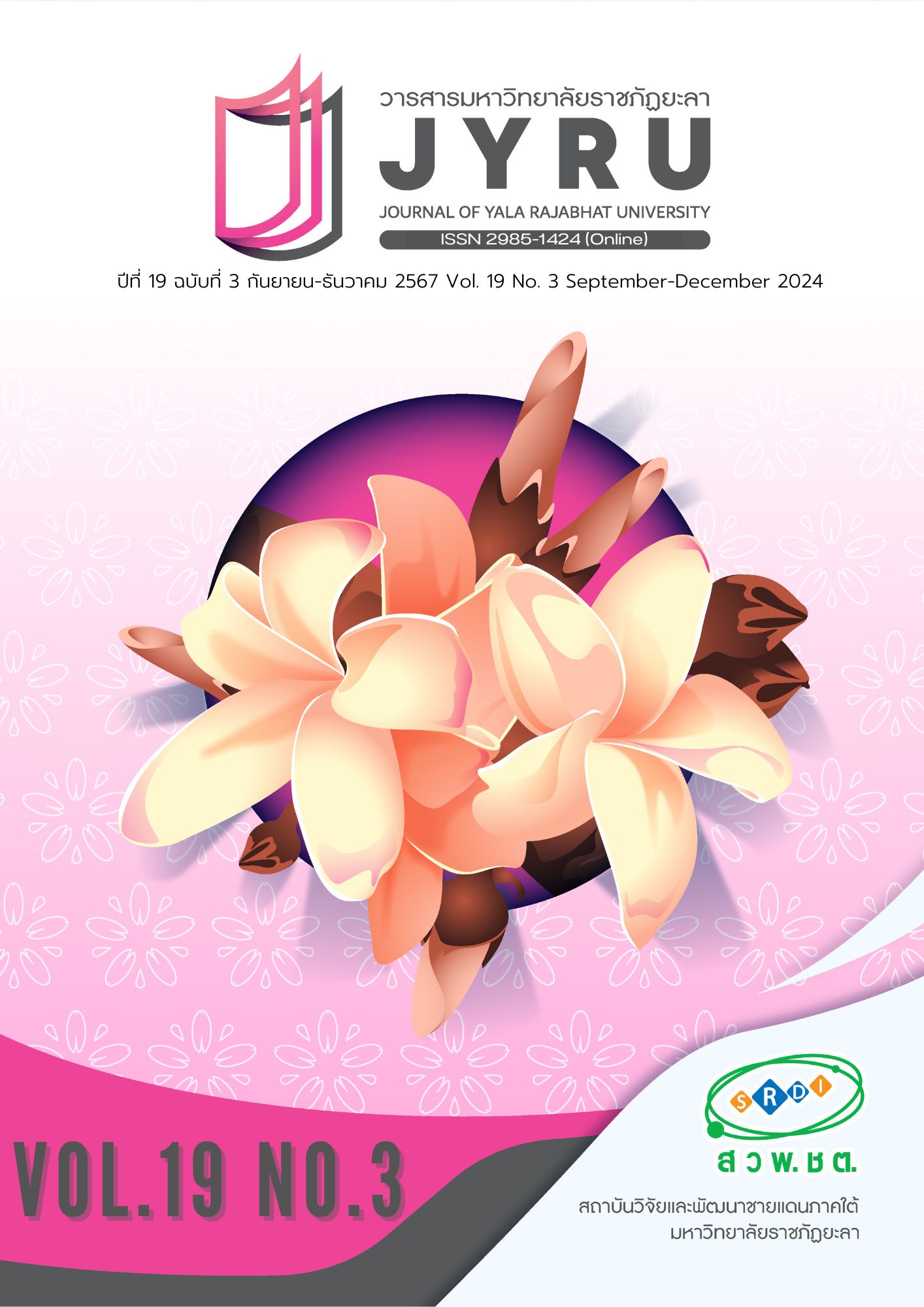Moral Reasoning Competency to Drive Ethical Society of Undergraduate Students in Southern Border Higher Education Institutions
Main Article Content
Abstract
Educational institutions play an important role in developing learners to have ethical competence and awareness of ethical issues in society. In particular, learners in higher education who are considered intellectuals of society should be promoted by using the mechanism of ethical reasoning. This research aims to analyze the moral reasoning competency to drive ethical society of undergraduate students in higher education institutions in the southern border provinces of Thailand. Data collection was conducted through document analysis and semi-structured interviews with 15 key informants including higher education faculty members, administrators and officers of student affairs, social activists, psychologists, and religious scholars. Selection of key informants was based on Snowball sampling with prescribed criteria. The instruments used for data collection were document analysis form and semi-structured interviews. Data analysis was performed using content analysis and triangulation methods.
The study revealed that the moral reasoning competence of undergraduate students in higher education institutions consists of 4 components. Mastery of Ethics and Social Phenomena involve both universal and religious-based ethical principle. Wasatimpathy implies demonstrating justly balance, unbiases, and empathy for others. Logical Systematic Thinking denotes ability to reason systematically and use sound judgment in pondering fact from various perspectives. Creative Ethical Communication deals with presenting ethical issues thoughtfully, and appropriate for the audience. This study offers suggestions for both academic and social benefits; these components can be incorporated into curriculum and activities to help students develop ethical behavior. Additionally, it will grow into a system that forces morals in universities to become even more tangible.
Article Details

This work is licensed under a Creative Commons Attribution-NonCommercial-NoDerivatives 4.0 International License.
Copyright Notice articles, information, images, etc. was published in this Journal of Yala Rajabhat University is a copyright of the journal Yala Rajabhat University. If any person or deparment wants to bring all or part of it for publish or take any action. Authorization is required in written form from the Journal of Yala Rajabhat University only.
References
Al-ghazali. [n.d.]. Ihya Ulum al-Din. (Vol. 3). Beirut: Dar Ibn Hazm.
Andi, A., Nasir, M., Benlakhdhar, E. & Jasmin, S. (2023). Strengthening Wasatiyyah for the youth through Islamic education. Tafahus: Jurnal Pengkajian Islam, 3(1), 1-19.
Bruni, S. & Cesario, J. (2020). The power of storytelling for ethical persuasion. Current Directions in Psychological Science, 29(6), 642-648.
Cameron, C. D., Conway, P. & Scheffer, J. A. (2022). Empathy regulation, prosociality, and moral judgment. Current Opinion in Psychology, 44(1), 188-195.
Chantavanich, S. (2016). Qualitative Research Methods. (12th ed.). Bangkok: Chulalongkorn University Press. (in Thai).
Kohlberg, L. (1981). The Philosophy of Moral Development: Moral Stages and the Idea of Justice. New York: Harper & Row.
McClelland, D. C. (1973). Testing for Competence rather than for "Intelligence". American Psychologist, Harvard University, January 1973, 1-14.
McDonald, J., Graves, J., Abrahams, N., Thorneycroft, R. & Hegazi, I. (2021). Moral judgement development during medical student clinical training. BMC medical education, 21(1), 140.
Meehanpong, P. & Chatdokmaiprai, K. (2018). Assessing Quality of Research Instrument in Nursing Research, Journal of The Royal Thai Army Nurses, 19(1), 9–15. (in Thai)
Muangprasert, N. (2021). Communication factors affecting performance of staff of the faculty of commerce and accountancy Chulalongkorn university. Master’s Thesis, Chulalongkorn University. (in Thai).
Office of the National Strategic Committee. (2019). National Strategy 2018-2037. (2nd Ed.). Bangkok: Office of the National Economic and Social Development Board. (in Thai)
Srisuwan, J. (2022). Development of a system for measuring and evaluating ethical reasoning competence for students. Doctor of Education Dissertation, Thammasat University. (in Thai)
The Organization for Economic Co-operation and Development (OECD). (2020). The future of education and skills Education 2030 [Online]. Retrieved 12 May, 2024, from: https://www.oecd-ilibrary.org/education/books
Tongsamsi, K. & Promgird, P. (2017). Variables affecting academic integrity of undergraduates in Three Southern Provinces. Humanities & Social Sciences, 34(3), 167-192. (in Thai)
Wanna, A., Sikkhabandit, S. & Onmung, P. (2016). Self-discipline management model for private higher education students. Journal of industrial education, 10(1), 109-118. (in Thai)


